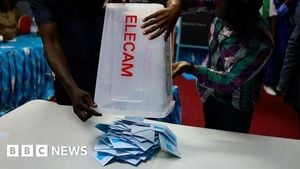In Wisconsin, a spirited debate over the taxation of tips has taken center stage, reflecting both local and national shifts in how service industry workers are treated under tax law. While a sweeping federal law now exempts a significant portion of tips from federal taxes starting in 2025, the Badger State’s own legislation to mirror that change has become mired in political gridlock and uncertainty, leaving workers and employers alike in limbo.
Back in January 2025, a group of Republican lawmakers in Wisconsin introduced a proposal to exempt cash tips received by service industry workers from state income tax. This move echoed a similar, but ultimately unsuccessful, bipartisan attempt from 2019. The renewed push came at a time when national momentum seemed to favor tip earners: President Donald Trump had just signed a federal “no tax on tips” provision into law on July 4, 2025, as part of his expansive tax cut and spending package. The federal law allows workers to deduct up to $25,000 in tips and $12,500 in overtime pay from their taxable income for the 2025 tax year, with the caveat that individuals earning over $150,000 are excluded from these benefits. These deductions are set to expire after tax year 2028 unless lawmakers act to extend them.
Despite this federal progress, Wisconsin’s state-level effort has faced significant hurdles. Democratic Governor Tony Evers included a measure to eliminate the state income tax on cash tips in his 2025-27 budget proposal. However, as reported by the Milwaukee Journal Sentinel, Republican members of the Legislature’s Joint Finance Committee swiftly removed the provision early in the budget process and did not revisit it. The GOP’s separate legislative proposal, which has not attracted any Democratic co-sponsors, was later amended to cover both cash and charged tips up to $25,000 per year. If approved, the measure would take effect for tax year 2025 and sunset after tax year 2028, mirroring the federal timeline.
The legislative journey for the Wisconsin bill has been slow and, so far, inconclusive. After its introduction in January, the proposal received a hearing in the Senate Committee on Agriculture and Revenue in May 2025, but the committee has yet to hold a vote to advance the bill. The amended version got a hearing in the Assembly Committee on Ways and Means on August 21, 2025, but again, no vote has been scheduled. Meanwhile, the state’s 2025-27 budget, signed into law with bipartisan support, included a tax cut package—but notably left out any “no tax on tips” provision, though it did exempt some retirement income from taxation.
The rationale behind the bill has been passionately articulated by its authors and supporters. During the August 21 Assembly hearing, State Representative Ron Tusler, a Republican from Harrison, argued, “Tips never should have been taxed in the first place. The folks that receive tips are not wealthy people, they're not usually middle-class people. Usually, they’re working-class people that are trying to get themselves to that middle-class level, to get themselves their American dream.” He went on to add, “As representatives, these are great folks for us to target, and as Christians, we should always be trying to help the poor.” Tusler also asserted that the bill would help employers make tips go further for their employees.
Business owners in Wisconsin’s service industry have echoed these sentiments. Erin Vranas, who owns Madison’s Parthenon Gyros, told lawmakers during the same hearing that it’s increasingly difficult for her to pass down relief to her employees when businesses themselves are “getting squeezed.” She argued that the proposed tax exemption could help retain and recruit workers in a sector already facing labor shortages and economic pressures.
Senator Andre Jacque, a Republican from De Pere, added his perspective: “This is something to help retain those workers that we already have in that sector of the economy, to recruit others … but fundamentally, tips are supposed to be something that are freely given … something in exchange for excellent service.”
For many service workers, tips are a critical component of their income. Wisconsin’s tipped minimum wage is just $2.33 per hour—far below the state’s standard minimum wage of $7.25. If a worker’s combined tips and hourly wage don’t reach $7.25, employers are required to make up the difference. Democrats in Wisconsin have introduced proposals to increase both the tipped and standard minimum wages, but Republicans often argue that employers already pay above the minimum to attract and retain workers in a tight labor market.
The Internal Revenue Service (IRS) has clear guidelines when it comes to tips and taxes. According to the agency, any tips of $20 or more per month from a single job are considered taxable wages. This includes not only cash received directly from customers, but also electronic payments, noncash tips (like tickets or other valuable items), and tips received through pools or informal sharing arrangements among employees.
With the federal “no tax on tips” law now in effect for the 2025 tax year, eligible workers won’t see an immediate increase in their take-home pay. However, as Milwaukee Journal Sentinel points out, they may notice a lower tax bill or an increased refund when they file their 2025 taxes in early 2026. The law’s benefits are limited to those earning under $150,000, and unless Congress acts, the deductions will vanish after 2028.
Yet, the path to actually claiming these federal tax benefits remains somewhat murky. On August 25, 2025, the IRS announced that, as part of its phased implementation of the One Big Beautiful Bill Act (OBBBA), there would be no changes to individual information on returns or to withholding tables for tax year 2025. Cities and employers are instructed to keep using current reporting and withholding procedures for overtime and tips, and IRS forms issued by employers—such as Form W-2 and Form 941—will remain unchanged for 2025. The agency acknowledged that it’s still unclear how individuals will report overtime or tips to claim OBBBA-related tax benefits when filing their personal tax returns in 2026, and it is working on new guidance for employers for 2026 and beyond.
For now, employees are encouraged to consult their own tax advisers to navigate this evolving landscape, as the IRS continues to develop additional information. The uncertainty has left many workers and business owners in a holding pattern, waiting for clarity from both state and federal authorities.
As the debate continues in Madison, the fate of the state-level “no tax on tips” bill remains uncertain. Lawmakers on both sides of the aisle acknowledge the challenges facing service workers, but sharp disagreements persist over the best way to provide relief—whether through targeted tax exemptions, broader wage increases, or other policy solutions. For Wisconsin’s tipped workers, the coming months will be critical in determining whether their state will join the federal government in lifting the tax burden on their hard-earned gratuities.




